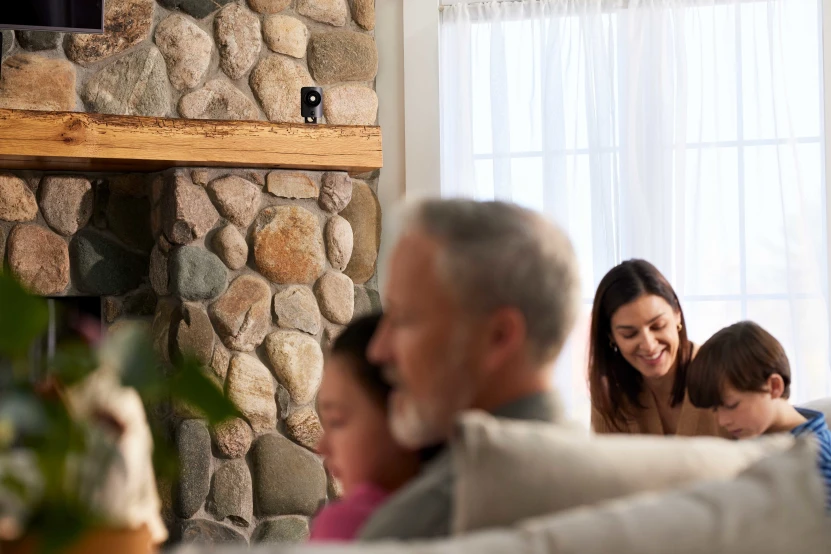Behavioral Expert Dr. Sundas Pasha Explains Our Evolving Relationship With Home
Posted April 11th, 2023 by SimpliSafe

As a behavioral medicine psychologist, most of my work is focused on the intersection of psychology and health. I was thrilled when SimpliSafe approached me to partner on their inaugural “Under One Roof” Trend Report, looking at how Americans' views of their homes have changed over the past few years.
Like SimpliSafe, I am interested in human behavior at home. In this post, I’m going to unpack some interesting behaviors the report revealed. I’ll focus on two key trends – how the gig economy and the evolving way we work are affecting the ways we live (and work) at home today, as well as some interesting generational differences.
The Gig Economy
The gig economy is the network of freelance workers who are behind many on-demand services popular today, whether it’s dog walking, grocery delivery or mounting a television. A key benefit of gig economy services is convenience, but the report suggests that convenience does not fully outweigh comfort, specifically when it comes to using on-demand services when the consumer themself is not physically present.
According to “Under One Roof,” Americans are overall wary of letting gig workers inside while they’re not home – only 12% of respondents feel comfortable with it. Interestingly, of those who are comfortable with it, younger generations are 4x more likely than older generations to trust gig economy workers in their homes. What could explain this divide?
Younger generations have grown up in a world that is more connected, on-demand and technologically advanced than ever before, and for Gen Z specifically, it is increasingly common to use services that connect them with independent contractors. As a result, this generation may be more psychologically accustomed to the idea of having strangers in their homes for short periods of time.
Additionally, younger generations are more likely to value authenticity and connection in their interactions with others, which may make them more willing to trust gig workers. Gen Z is often described as a socially conscious and inclusive generation, and they may be more likely to view gig workers as individuals like themselves who are trying to make a living and contribute to society in meaningful ways.
On the flip side, older generations may be more protective of their privacy and personal space and may feel uncomfortable with the idea of having strangers in their homes. Additionally, older generations may be less familiar with the latest technology and feel uncomfortable using apps or online platforms to hire service providers. This can explain the feelings of skepticism that may arise about the safety and reliability of on-demand technology in general within the older generations.
The Rise of Remote Work
It’s no secret that the COVID pandemic changed the way Americans work, and even today, remote work continues to grow in popularity. Remote work has changed not only the way we work, but also the way we utilize our homes.
For people who have the flexibility to work from home some or all the time, it has given them flexibility to work from various locations. Almost a quarter of respondents (24%) spent at least one week last year working from a different location than they typically do – like a family member’s house, a rental house or hotel. That figure increases to 52% when we look at Gen Z.
And while people are seemingly taking advantage of the ability to work from anywhere, people are also happy to return home. The vast majority (85%) of respondents are at least moderately happy to get home after a trip.
Why might this be? People often enjoy getting away for a change in scenery because it can provide a break from routine and offer opportunities for new experiences and perspectives. Traveling can be a way to explore different cultures, environments, and ways of living, which can be enriching and stimulating. It can also provide an opportunity for relaxation and stress relief, allowing individuals to recharge and rejuvenate.
However, even when people enjoy traveling and experiencing new things, they may also feel a strong attachment to their home environment. Home is where individuals can be themselves, surrounded by familiar people, objects and routines therefore, returning home after traveling can be comforting, stabilizing and reassuring. Plus, the rise of remote work – and the pandemic more broadly – has also exacerbated the priority and emphasis that many people place on their home environments. Before the pandemic, home was likely somewhere to sleep and perhaps somewhere to relax and recharge, but for many of us, home has evolved and taken on a new meaning and purpose.
We’re seeing people utilize their home space in so many new ways - many individuals are using their homes for a variety of purposes such as exercising, cooking, entertaining, and working from home. As a result, we’re seeing people prioritize the protection of their homes and loved ones. Interestingly, of the Americans surveyed, those that own home security technology are more likely to work from home part of the time or all of the time – again, suggesting that being home more may increase the importance that people place on it.
So, what to make of these report findings? I believe the three biggest takeaways are:
People want convenience, but not at the expense of their comfort and safety. Innovative technology, like smart home security devices, is enabling consumers to maximize the benefits of on-demand services, without compromising on their comfort. For instance, by setting up Custom PINS with a Smart Lock, people can delegate access to their location to a painter or dog walker, without allowing an individual to make changes to their SimpliSafe system. They’ll also have visibility into which PIN was used to arm or disarm their system in the timeline on the Mobile App or Web app.
Home security technology can serve not only a functional need, but also an emotional need. Not only have people’s work and life arrangements evolved, but so too have their attitudes towards proactively protecting the things that matter most to them. Home security can protect not only their physical property, but also protect their mental wellbeing, knowing they’re backed by advanced technology and human professionals.
Home is invaluable. It’s not only the biggest financial investment that many people make in their lifetime, but moreover, home houses many of our most valued possessions, including our loved ones.
I’d love to hear from you! How has your relationship with your own home changed over the last three years?
BIO
Dr. Sundas Pasha Fick is a licensed Clinical Psychologist who specializes in behavioral medicine. Dr. Pasha treats individuals who are suffering from mental health struggles such as anxiety, depression, and chronic pain. She is an avid believer in both mental and physical wellness, with the ultimate goal of helping people understand the powerful impact of the brain-body connection.
